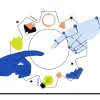Cyber Security is becoming more of an issue each day. If your business has a website, making it is secure should be one of your top priorities. Even if you consider your website small or unknown, hackers could still attack it. Website owners who fall victim to hackers may experience crashed websites, loss or ransoming of important data, or potentially being used as a host for distribution of malware. Here are five simple ways you can keep your website secure:
Update Your Software
Regardless of what type of software you used to build your site, it is your responsibility to make sure it’s up to date. The older versions of software often contain bugs in the coding that can make it easy for hackers to accomplish their goal. Updating software for most modern Content Management Systems is fairly quick & simple.
Switch to HTTPS
HyperText Transfer Protocol Secure or HTTPS is the secure version of HTTP. When you transfer your website from HTTP to HTTPS, all communications between a browser and your website will be encrypted. If your website features online shopping order forms or confidential transactions, HTTPS is particularly important. Your web developer or sometimes even your web hosting company will be able to help you switch to https by installing an SSL Certificate.
Use Strong Passwords
Although this may seem like an obvious cybersecurity tip, many people choose passwords that are easy to remember rather than ones that are strong and difficult for hackers to predict. Be sure your passwords are a combination of upper and lower case letters and contain symbols as well as numbers. In addition to ensuring your passwords are strong, remember to change them on a regular basis.
Disguise Your Admin Directories
Hackers can easily access the data on your website by going straight to your admin directories. Rather than naming your admin directories with words such as “login” or “admin,” choose names that hackers would not be able to guess.
Install a Web Application Firewall
The purpose of a web application firewall is to analyze, block, or filter out bad traffic. It can be hardware or software based and offers an additional layer of protection against hackers. By following these tips, you can reduce your risk of finding out that your website was hacked and protect your business as a result.















